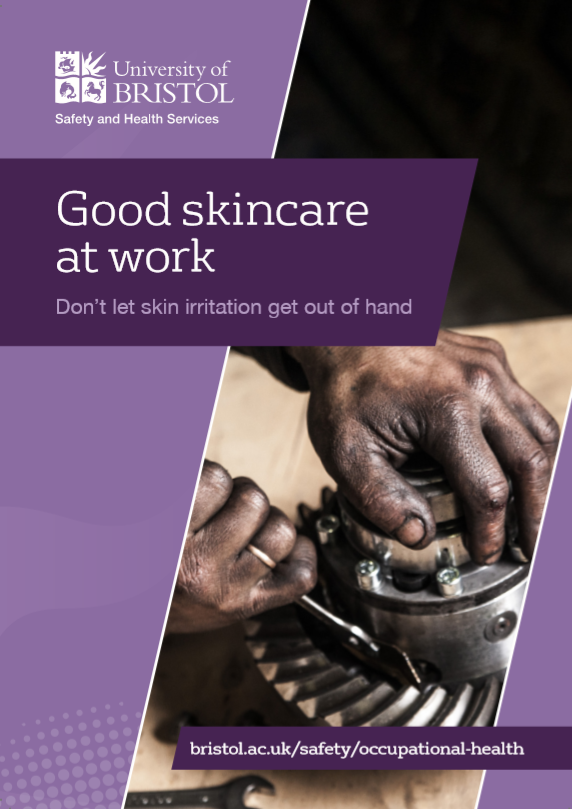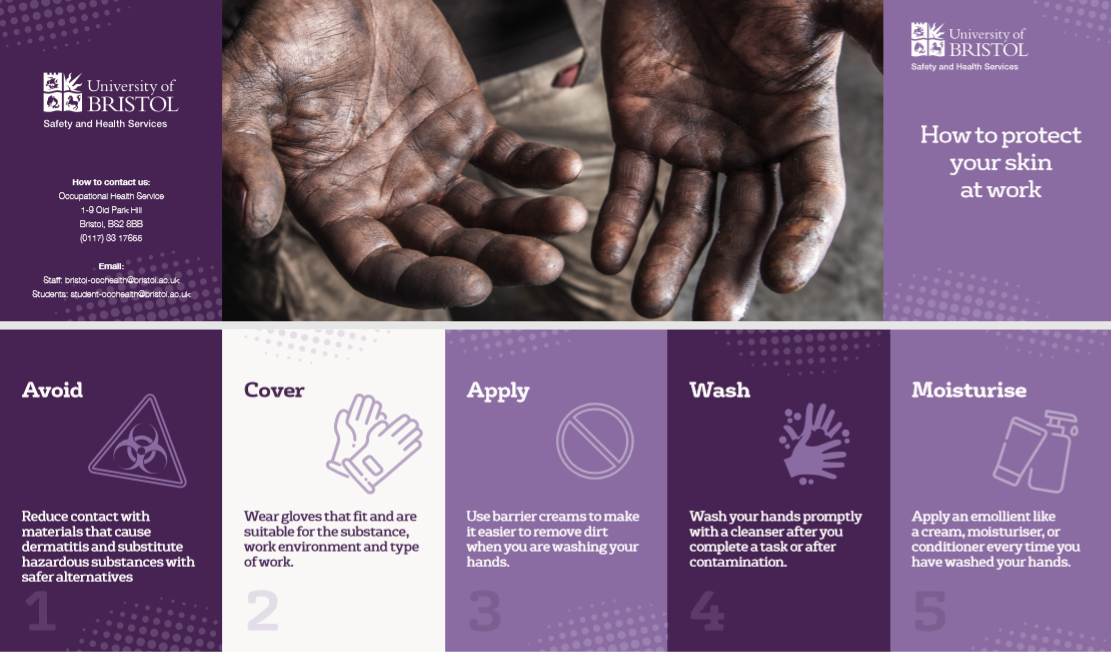Skincare at work
Your skin is a protective organ. It’s important to keep up good skincare at work, especially if your skin is exposed to damaging substances in a technical work environment.
Work-related skin problems almost always take the form of dermatitis, eczema, or occupational skin disorders (OSDs).
Causes of dermatitis
Dermatitis can be caused by contact with a range of materials, including:
- solvents and mineral oils,
- chemicals; acids and alkalis,
- cleaning agents and detergents,
- natural products such as food and water with prolonged contact.
Frequently rubbing or washing your skin can also cause dermatitis, particularly if soap residue is not washed off properly or if the skin is not dried.
 Leaflet
Leaflet
Advice for how to monitor and maintain good skincare at work.
 Pocket card
Pocket card
Pull-out pocket card about how to protect your skin at work.
Jobs that are sometimes associated with dermatitis include:
- cleaning,
- engineering,
- gardening,
- maintenance,
- technical roles.
Main symptoms of dermatitis
You might experience the main symptoms of dermatitis on your hands.
Symptoms of dermatitis
- A skin rash, dryness or cracking of the skin, typically consisting of an area of red swollen skin, sometimes with tiny blisters which may weep and form a crust.
- Skin becoming itchy, scaly or flaky, and if it persists for a long time, becoming thickened and cracked.
After repeated exposures, your cells can recognise chemicals if they penetrate the skin, causing a reaction of intense itching.
Protecting your skin
Developing a skin irritation could cause serious health problems. It's important to care for your skin to prevent damage.
Step one: Avoid contact with materials that cause dermatitis
Substituting hazardous materials with safer alternatives is the first action to take. Avoiding exposure to hazardous substances that can cause dermatitis is a simple way to protect your skin.
- Always follow control measures outlined in risk assessments.
- Consider how you can use equipment for handling or automate processes.
- Don’t immerse your hands in chemicals.
- Avoid skin contact with contaminated surfaces.
Step two: Wear gloves
Not all gloves protect against all chemicals; some chemicals can pass through a glove and appear as a vapour. You must match your gloves to the substance, the work environment, the type of work and the wearer.
- Always ensure your gloves are suitable for the task, stored correctly and replaced when necessary.
- Make sure you are putting clean hands into clean, undamaged gloves and that you know how to take them off without contaminating your skin.
- Never wear powdered latex gloves.
Gloves for use with chemicals will carry a:
- CE mark
- chemical protection sign
- relevant European standard number (eg, EN 374).
Step three: Apply barrier creams
Pre-work barrier creams have a limited role in protecting skin from hazardous substances, but they do make it easier to remove dirt when you are washing your hands. This reduces the need for abrasive scrubs or powerful detergents.
- Combine barrier creams with other measures for good skincare at work.
Step four: Cleanse frequently
Wash your hands promptly after your complete a task, remove your gloves or following any contamination. The longer a substance remains on your skin, the more time it has to penetrate and cause damage.
Frequently cleansing may be necessary, but cleansers can also cause some skin damage. Choose the mildest cleanser available that will remove the dirt effectively.
- To cleanse your hands, wash them in running water that is a lukewarm temperature.
- Avoid hot water, which damages the layer of fats in the skin that provide the main barrier against chemicals.
- Make sure that all dirt and soap is rinsed away.
- Dry your skin properly, ideally using high quality paper towels. Wet skin is more likely to transmit bacteria, so the risk of infection is increased.
Step five: Restore moisture
Applying an emollient like a cream, moisturiser, or conditioner every time you have washed your hands will help you maintain the correct moisture balance for your skin to work properly.
A wide range of emollients are available, varying from very greasy products like ointments to less greasy options like creams. Emollients should be bland and non-perfumed.
- For mild skin dryness, a lotion or cream may be the most suitable option.
- Thicker creams or ointments are usually best for moderate to severe dryness.
- Always check the ingredients if you have skin allergies; sensitivity to lanolin is not uncommon.
Just one minute of contact with a substance you are sensitive to can cause a rash lasting for days.
Skin sensitivities like this generally remain for life.
What to expect from the University
Through our Occupational Health Service, we monitor how your work environment could affect your health.
If we have identified that your work at the University is likely to cause dermatitis, a risk assessment will be carried out and adequate control measures will be put in place to prevent ill health or worsening of health conditions due to your job or working environment.
What to do if you experience difficulties with your skin
Report any work-related skin problems to your manager, who can refer you to the Occupational Health Service for advice regarding working practices, skin care, treatment and glove use.
Advice for managers
Managers need to train staff, provide instruction and suitable personal protective equipment (PPE) and washing facilities.
If you have groups of employees who are regularly exposed to skin irritants during their work, you may need to set up a system of regular skin checks carried out by a competent person within your school or service.
Contact us for further advice and training.